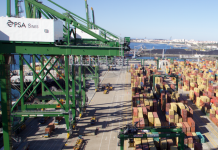
A new report conducted by the International Renewable Energy Agency (IRENA) has shown that a rapid replacement of fossil fuels with renewable fuels based on green hydrogen and advanced biofuels could cut up to 80% of carbon dioxide (CO2) emissions attributed to international maritime shipping by mid-century.
Renewable fuels should contribute at least 70% of the sector’s energy mix in 2050, for the global decarbonisation of the shipping sector, in line with the 1.5°C climate goal, according to IRENA’s publication “A Pathway to Decarbonise the Shipping Sector by 2050.”
Furthermore, the report found that the production costs of alternative fuels and their availability will ultimately dictate the actual employment of renewable fuels. “Moving from nearly zero CO2 emissions to net-zero requires a 100% renewable energy mix by 2050,” explained a representative of the intergovernmental organisation.
While renewable energy costs have been falling at an accelerated rate, further cost declines are needed for renewable energy-derived fuels to become the prime choice of propulsion. Climate goals and decarbonisation ambition can be raised by adopting relevant and timely coordinated international policy measures.

Meanwhile, the Marine Bunker Exchange (MABUX) World Bunker Index continued its firm upward trend during week 41. The 380 HSFO index and the VLSFO index rose to US$533.68/MT and US$631.86/MT, respectively, while the MGO index increased to US$756.13/MT.

MABUX has announced that the publication of the MABUX ARA LNG Bunker Index will temporarily be suspended as the LNG bunkering market has practically stalled due to falling demand caused by a sharp increase in gas prices in Europe.
“We believe the gas crisis is temporary and expect LNG bunkering operations to resume by the end of this year. The publication of the MABUX ARA LNG Bunker Index will resume as soon as the LNG bunker market recovers,” noted a MABUX representative.
In the meantime, the average weekly Global Scrubber Spread (SS) – the difference in price between 380 HSFO and VLSFO – continued a slight decline during week 41, amounting to US$92.65.
At the same time, the average weekly SS Spread in Rotterdam declined to US$98.17, while the average SS Spread in Singapore reaches US$69.50.

Correlation of MABUX MBP Index (Market Bunker Prices) vs MABUX DBP Index (MABUX Digital Benchmark) in the four global largest hubs over the past week showed that 380 HSFO fuel was overvalued in all selected ports, except Houston where the index recorded an underpricing of US$14.
In other ports, 380 HSFO was overcharged as follows: in Rotterdam – plus US$25, in Singapore – plus US$48 and in Fujairah – plus US$29.
Regarding the VLSFO fuel grade, according to the MABUX MBP / DBP Index, was in the undervaluation zone in two out of four selected ports: in Singapore by minus US$8, in Fujairah by minus US$10.
However, in Rotterdam and Houston, this fuel grade was overvalued by US$2 and US$5 respectively.
The MABUX MBP / DBP Index also recorded an undercharge of MGO LS fuel at all selected ports: minimum value in Houston, with a minus US$4 and a maximum value in Fujairah – minus US$50.









